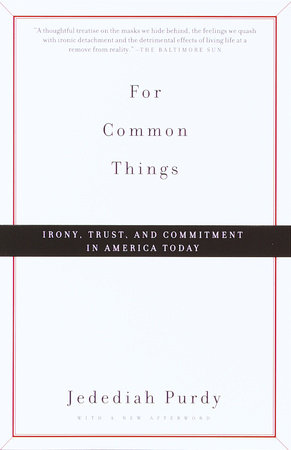For Common Things by Jedediah Purdy.
On living unironically (emphasis mine):
In all of these ways, West Virginia meant perfect confidence in the reality of things. I developed one of our hillside springs, digging out a natural seep, filling it with filtering gravel, and ditching out a pipe-run between it and our house, more than a hundred yards below. I drilled the boreholes that brought sap from the living wood of our maples. Although I never pulled the trigger when we slaughtered our steers, I helped to skin and gut a few that I had named. When we spoke about these things, there, we could be confident that our words sat squarely on things that we knew in common. Maybe because so much of our talk had to do with these stable, certain, solid things, West Virginia was not an ironic place. There was not much talk of trust, hope, or reliance; but there was a great deal of each of those, so thoroughly present that there was no need to name them. They were bound up in the things we did name.
On work (emphasis mine):
One thing that a culture does is to give people ways of thinking about what they are doing. They can see the connections among their work, their talents, and the needs of the world. They perceive their work as belonging to a whole, some of whose possibilities are good, which they help to sustain. In other words, a rich culture helps people to say what their work is for, what its purposes are. This means that an architect can understand how her work serves the purpose of creating heartening places for people to live and work, a journalist the aim of informing people of their community’s business and the world’s, a doctor making possible healthy lives, or a farmer feeding people and maintaining fertile land. A person can also appreciate how her trade enhances her own life by developing her best talents or important human qualities: for the architect, spatial and aesthetic perception and an intuitive sense of how space either puts people at ease or disquiets them; for the journalist, effective writing, a feeling for the line between truth and falsehood, and the knack for drawing scattered facts into an intelligible story. Moreover, a culture presents us with standards of excellence that are independent of us and dignify our work when we satisfy them: sound and gracious design, clear and true writing, or the health of a farmer’s fields and livestock. Work that can be good in these elemental ways can also, necessarily, be bad. It can fail. There are ruined fields, unintelligible essays, and displeasing buildings. Just as good work gives a measure of sense and dignity to a person’s activity, bad work is degrading. A job or an industry that does not offer the possibility of good work, that is manifestly unnecessary, that develops no talents, that achieves no excellences, is a species of tragedy, or of insult.
